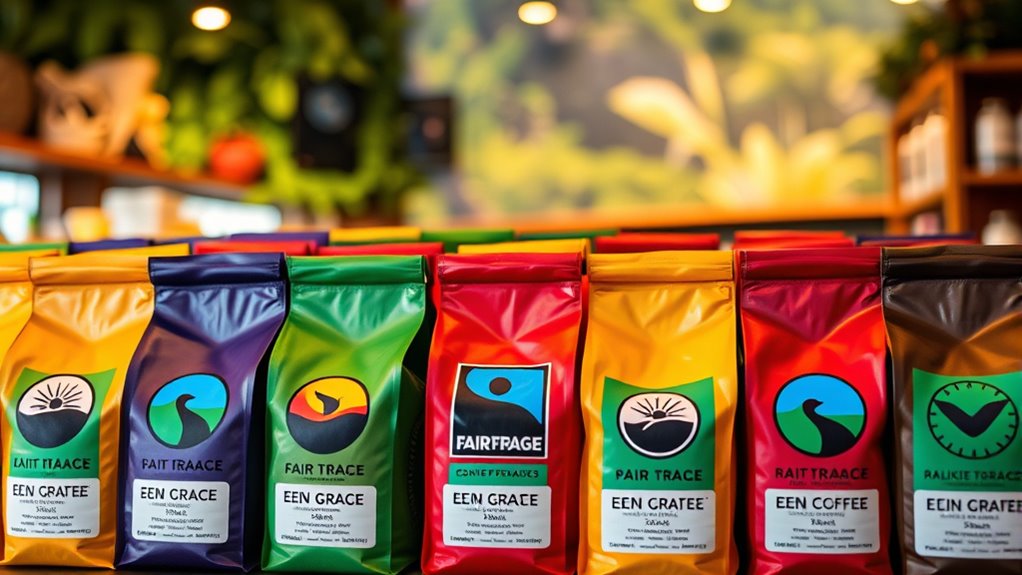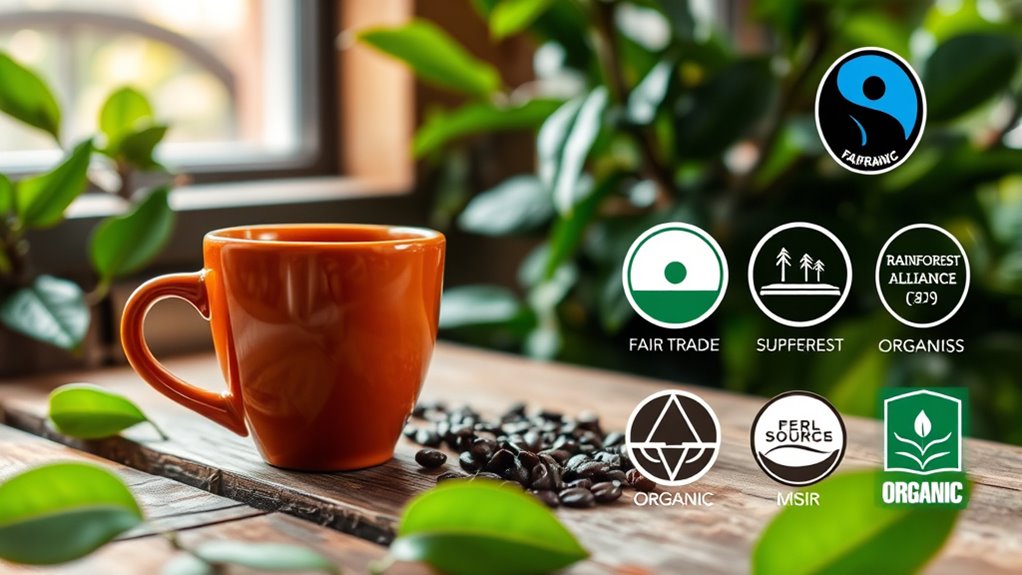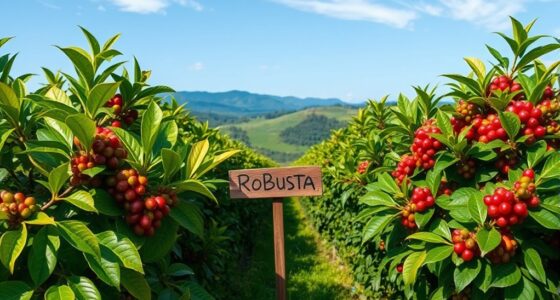Sustainability certifications like Fair Trade and Organic help you identify coffee that supports environmental health, social fairness, and fair wages. Fair Trade ensures farmers get fair prices and work under decent conditions, while Organic focuses on chemical-free farming that benefits the planet. Both often overlap, offering a holistic approach to responsible production. If you want to comprehend how these labels can guide your choices and make a positive impact, there’s more to discover below.
Key Takeaways
- Fair Trade emphasizes fair wages, social equity, and community development, ensuring farmers receive equitable income and decent working conditions.
- Organic certification focuses on environmentally friendly farming practices, avoiding synthetic chemicals to promote soil health and ecological balance.
- Both certifications often overlap, promoting sustainable agriculture, higher bean quality, and transparency in production standards.
- Certifications help consumers make responsible choices, supporting ecological conservation, social justice, and fair economic practices.
- While beneficial, certifications can be manipulated; they serve as guides to encourage more sustainable and ethical coffee production.

Have you ever wondered what makes a coffee truly sustainable? It’s not just about the taste or the price—it’s about how it’s grown, who benefits, and the environmental impact behind it. When you see certifications like Fair Trade or Organic, they’re more than just labels; they’re commitments to better practices that aim to create a more equitable and eco-friendly coffee industry. Fair Trade certification ensures that farmers receive fair prices for their crops, which helps lift communities out of poverty and promotes social equity. It also guarantees that workers have decent working conditions and that farmers can afford investments in their farms and families. Organic farming, on the other hand, emphasizes the avoidance of synthetic chemicals, pesticides, and fertilizers. It promotes soil health, reduces environmental pollution, and supports biodiversity. When you choose coffee with organic certification, you’re encouraging farming methods that prioritize ecological balance and long-term sustainability. Both certifications play crucial roles, but they focus on different aspects of sustainability. Fair Trade concentrates on social and economic fairness, ensuring farmers and workers are paid fairly and work under fair conditions. Organic farming emphasizes environmental sustainability, focusing on healthful growing practices that protect ecosystems. You benefit from these certifications because they provide transparency, so you know your coffee is produced under specific standards that support sustainability goals. When you pick a Fair Trade-certified coffee, you’re helping to promote fair wages and community development projects, like schools and healthcare. Organic coffee supports healthier ecosystems by reducing chemical runoff and conserving water and soil quality. Together, these certifications often overlap, offering a holistic approach to sustainable coffee. It’s worth noting that certifications also encourage farmers to adopt better agricultural practices, which can lead to higher-quality beans and better flavor profiles. By choosing certified coffee, you’re not just enjoying a great cup; you’re also contributing to a system that values environmental health, social justice, and economic fairness. While certifications aren’t perfect and can sometimes be manipulated, they remain useful tools to guide your choices toward more responsible coffee consumption. When you understand what these labels stand for, you can make informed decisions that support farmers, protect ecosystems, and promote fairness across the supply chain. Ultimately, sustainable coffee is about making a difference—one cup at a time—and recognizing the importance of certifications like Fair Trade and Organic farming helps you align your coffee habits with your values. So, next time you reach for your favorite brew, consider what it stands for and how your choice can support a more sustainable, equitable coffee industry.
Frequently Asked Questions
How Do Certifications Impact Coffee Flavor Profiles?
Certifications like shade-grown often help preserve coffee’s natural flavor profiles by protecting the beans from over-processing. When you choose shade-grown coffee, you support flavor preservation because the slower ripening process enhances complexity and nuanced notes. These certifications can influence flavor by promoting sustainable practices that maintain the bean’s integrity, ensuring each cup offers a richer, more authentic taste experience that reflects the coffee’s terroir and careful cultivation.
Are All Sustainability Certifications Equally Recognized Internationally?
Not all sustainability certifications are equally recognized internationally. Certification standards vary, and some hold greater credibility due to rigorous auditing processes and global acceptance. You should look for certifications with high certification credibility, like Fair Trade or Rainforest Alliance, which are widely acknowledged and trusted worldwide. This guarantees your coffee meets consistent sustainability criteria, making it easier to communicate its value and appeal to international markets.
Do Certifications Guarantee Fair Wages for Coffee Farmers?
You might hope certifications guarantee fair wages, but that’s not always the case. While many have strict fair wage policies, enforcement varies widely. Certification bodies conduct audits, but some farmers still face challenges meeting fair wage standards. So, don’t assume a label automatically ensures fair pay; it’s essential to research how rigorously certification enforcement is upheld in each program. Stay vigilant—your choices influence positive change in coffee farming.
How Do Certifications Influence Coffee Pricing for Consumers?
Certifications influence your coffee pricing by adding costs that get passed on to you, due to certification costs like audits and compliance. However, they also boost consumer trust, making you more willing to pay a premium for ethically sourced coffee. While these certifications can raise prices, you often benefit from better quality and transparency, knowing your purchase supports sustainable farming practices and fair treatment of farmers.
Can Certifications Address All Environmental Impacts of Coffee Farming?
Certifications can’t fully address all environmental impacts of coffee farming. While they promote soil health and biodiversity preservation, issues like water pollution or deforestation might still occur outside certification standards. You should see certifications as helpful tools, but not exhaustive solutions. To truly protect the environment, you need to support farms committed to holistic sustainable practices that go beyond just earning a certification.
Conclusion
As you sip your next cup of coffee, imagine the lush, vibrant plantations where each bean is nurtured with care. By choosing coffees with trusted sustainability certifications, you help protect these thriving landscapes and support communities that depend on them. Your choice becomes a ripple, shaping a future where coffee farms flourish in harmony with nature. Every sip becomes a small act of kindness, turning your everyday moment into a celebration of responsible, sustainable coffee.









